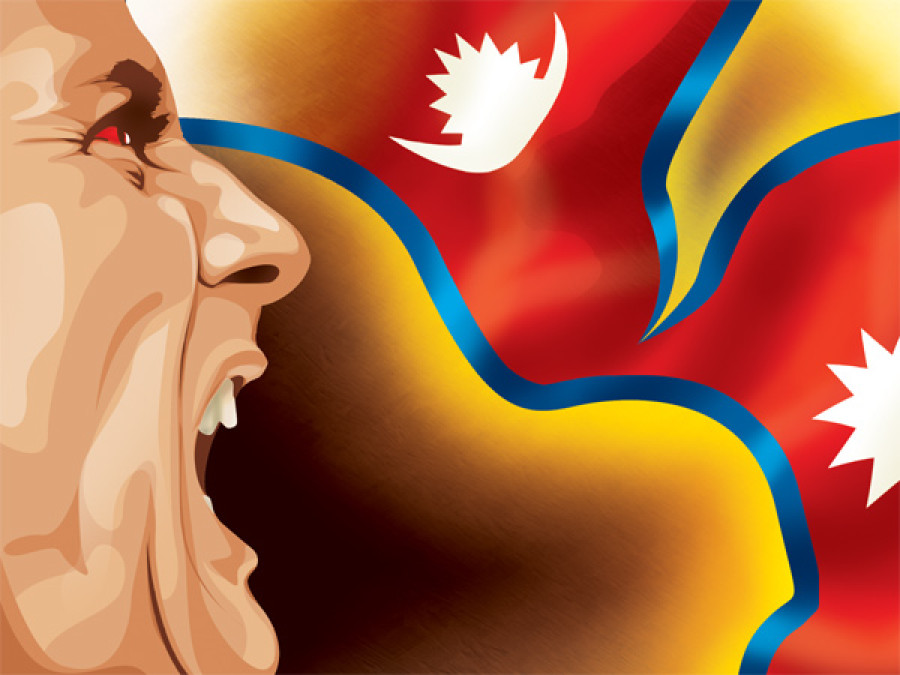Opinion
Divided loyalties
Fledgling political analysts on social media should focus on decreasing ethnic tensions instead of fueling it
Subin Mulmi
The the ongoing unrest in the southern belts of Nepal preceded by the infamous Tikapur incident have triggered polarised debates on the constitution in the social as well as mainstream media. What started as logical discussions between intellectuals have gradually turned into heated arguments. But the Nepali people need to be cautious as external forces have always sought to reap the benefits of such divisions, and the recent Indian intervention is just another example of it.
The forces from the left have been arguing that the present constitution only serves the interests of the elite hill caste groups, subjugating the rights of the oppressed minorities. On the other hand, the forces from the right, who occupied two-thirds majority in the Constituent Assembly (CA), have been contending that the constitution was passed by a democratically elected body representing all ethnicities and castes, and that it respects the rights of the oppressed minorities. The intellectuals inclined towards either side have been successful in cajoling their supporters who do not have the ability to discern the convolutions of the arguments that are being presented to them.
Divide and rue
Subsequently, social media enthusiasts have now become avid political analysts as well, undertaking campaigns and extreme measures to uphold their arguments. The extreme nature of those arguments has instigated their gullible followers to adopt radical measures to express their opinions as well. The celebration of the new constitution in the hills and the fanatic burning of the democratically promulgated constitution in the Tarai is a consequence of such actions. Whereas the majority of the people in the hills were tweeting #Isupportconstitution, triumphantly welcoming the constitution, most of the people in Tarai were mourning and expressed their vent with #Notmyconstitution.
India has always taken a keen interest in the domestic affairs of Nepal, and this conflict has presented a new opportunity for it to poke its nose our internal decisions. Had the situation been resolved by the domestic forces themselves, this would not have happened. India has a lot to gain from a divided Nepal. Their supposed intervention has further aggravated the divide among the people with the forces from the right responding with #backoffindia and the people on the left justifying Indian actions. Furthermore, the conflicting sides do not seem to be willing to agree on anything at all.
Unfortunately because of these events, we have arrived at a point where even if all the Madhesi demands are fulfilled, the hilly contingent will always perceive this decision to be aided by India and continue to antagonise the Madhesi community. And if the Madhesi leaders finally surrender to the decision of the big three parties, the Madhesi contingent will never forget that the hill people turned a blind eye to the prolonged curfew and subsequent killings in the Tarai.
Time to unite
Apart from the external forces, the political leaders from both the sides of the debate are also benefiting from this situation. The Madhesi leaders who lost miserably lost in the second CA elections have now regained their amour propre amongst the Madhesi community. Similarly, the people from the hills have started to worship the leaders of the three major parties as true nationalists of this country, forgiving them of their past sins.
In this chaos, the earthquake that took place less than six months ago has been completely forgotten by the people. And regrettably, the youth of the nation who showed immense maturity and compassion during the earthquake are now embroiled in this polarised debate. But even after continuous attempts to convince the other party, both the sections are still not willing to budge from their position and strongly feel that the other party will one day succumb to their interests.
Thus, the government needs to handle the ongoing scenarios wisely as on average, more than 50 percent of states emerging from conflict relapse into conflict. The ever expanding ethnic polarisation in Nepal seems to indicate that the country might be heading to a similar direction unless the conflicting parties reach an agreement soon. The fledgling political analysts on social media should now shift the discourse to resolving the crisis and decreasing ethnic tensions rather than encouraging it. Leaving the analysis of the specifics to the experts, they should now exhort the conflicting parties to end the deadlock.
Mulmi is a human rights lawyer




 22.12°C Kathmandu
22.12°C Kathmandu










